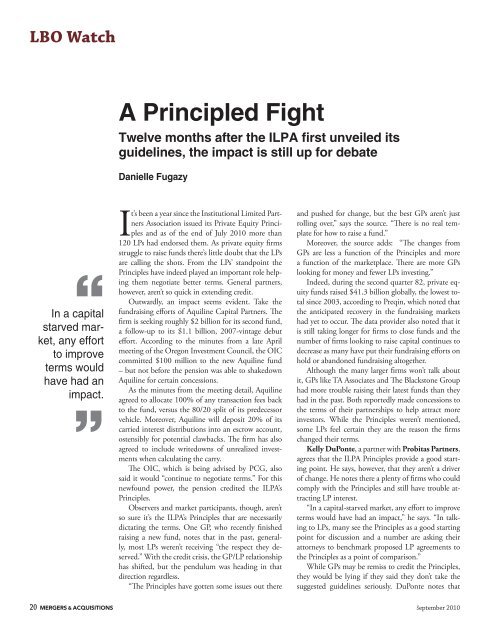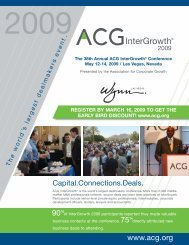September 2010 - Association for Corporate Growth
September 2010 - Association for Corporate Growth
September 2010 - Association for Corporate Growth
Create successful ePaper yourself
Turn your PDF publications into a flip-book with our unique Google optimized e-Paper software.
LBO Watch<br />
<br />
<br />
<br />
<br />
“ <br />
<br />
<br />
<br />
<br />
<br />
<br />
”<br />
It’s been a year since the Institutional Limited Partners<br />
<strong>Association</strong> issued its Private Equity Principles<br />
and as of the end of July <strong>2010</strong> more than<br />
120 LPs had endorsed them. As private equity firms<br />
struggle to raise funds there’s little doubt that the LPs<br />
are calling the shots. From the LPs’ standpoint the<br />
Principles have indeed played an important role helping<br />
them negotiate better terms. General partners,<br />
however, aren’t so quick in extending credit.<br />
Outwardly, an impact seems evident. Take the<br />
fundraising ef<strong>for</strong>ts of Aquiline Capital Partners. The<br />
firm is seeking roughly $2 billion <strong>for</strong> its second fund,<br />
a follow-up to its $1.1 billion, 2007-vintage debut<br />
ef<strong>for</strong>t. According to the minutes from a late April<br />
meeting of the Oregon Investment Council, the OIC<br />
committed $100 million to the new Aquiline fund<br />
– but not be<strong>for</strong>e the pension was able to shakedown<br />
Aquiline <strong>for</strong> certain concessions.<br />
As the minutes from the meeting detail, Aquiline<br />
agreed to allocate 100% of any transaction fees back<br />
to the fund, versus the 80/20 split of its predecessor<br />
vehicle. Moreover, Aquiline will deposit 20% of its<br />
carried interest distributions into an escrow account,<br />
ostensibly <strong>for</strong> potential clawbacks. The firm has also<br />
agreed to include writedowns of unrealized investments<br />
when calculating the carry.<br />
The OIC, which is being advised by PCG, also<br />
said it would “continue to negotiate terms.” For this<br />
newfound power, the pension credited the ILPA’s<br />
Principles.<br />
Observers and market participants, though, aren’t<br />
so sure it’s the ILPA’s Principles that are necessarily<br />
dictating the terms. One GP, who recently finished<br />
raising a new fund, notes that in the past, generally,<br />
most LPs weren’t receiving “the respect they deserved.”<br />
With the credit crisis, the GP/LP relationship<br />
has shifted, but the pendulum was heading in that<br />
direction regardless.<br />
“The Principles have gotten some issues out there<br />
and pushed <strong>for</strong> change, but the best GPs aren’t just<br />
rolling over,” says the source. “There is no real template<br />
<strong>for</strong> how to raise a fund.”<br />
Moreover, the source adds: “The changes from<br />
GPs are less a function of the Principles and more<br />
a function of the marketplace. There are more GPs<br />
looking <strong>for</strong> money and fewer LPs investing.”<br />
Indeed, during the second quarter 82, private equity<br />
funds raised $41.3 billion globally, the lowest total<br />
since 2003, according to Preqin, which noted that<br />
the anticipated recovery in the fundraising markets<br />
had yet to occur. The data provider also noted that it<br />
is still taking longer <strong>for</strong> firms to close funds and the<br />
number of firms looking to raise capital continues to<br />
decrease as many have put their fundraising ef<strong>for</strong>ts on<br />
hold or abandoned fundraising altogether.<br />
Although the many larger firms won’t talk about<br />
it, GPs like TA Associates and The Blackstone Group<br />
had more trouble raising their latest funds than they<br />
had in the past. Both reportedly made concessions to<br />
the terms of their partnerships to help attract more<br />
investors. While the Principles weren’t mentioned,<br />
some LPs feel certain they are the reason the firms<br />
changed their terms.<br />
Kelly DuPonte, a partner with Probitas Partners,<br />
agrees that the ILPA Principles provide a good starting<br />
point. He says, however, that they aren’t a driver<br />
of change. He notes there a plenty of firms who could<br />
comply with the Principles and still have trouble attracting<br />
LP interest.<br />
“In a capital-starved market, any ef<strong>for</strong>t to improve<br />
terms would have had an impact,” he says. “In talking<br />
to LPs, many see the Principles as a good starting<br />
point <strong>for</strong> discussion and a number are asking their<br />
attorneys to benchmark proposed LP agreements to<br />
the Principles as a point of comparison.”<br />
While GPs may be remiss to credit the Principles,<br />
they would be lying if they said they don’t take the<br />
suggested guidelines seriously. DuPonte notes that<br />
20 MERGERS & ACQUISITIONS <strong>September</strong> <strong>2010</strong>

















